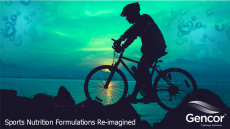Vitafoods Asia 2018
HMOs a goldmine of human health applications beyond infant formula: DuPont expert

Lyck was presenting findings from clinical trials on HMOs and their potential applications for not just infant health, but also adult and senior health.
Drawing from nature
At the moment, DuPont’s HMO research has centred around 2’-Fucosyllactose (2’-FL), which is the most abundant of more than 130 oligosaccharides that have been identified in human breastmilk so far.
Fermentation is typically used to produce the most abundant of HMOs, which enables scalable production. Together with clinical studies pointing to the safety and efficacy of commercially produced HMOs, this has encouraged infant nutrition firms to invest in HMO-enriched infant nutrition and dietary supplements.
In terms of clinical trials, epidemiological studies have found a correlation between fewer incidents of diarrhoea in infants and higher 2’-FL concentration in human milk.
Infant formula containing 2’-FL and Lacto-N-neotetraose (LNnT) has also been shown to be safe, well-tolerated, and supportive of age-appropriate growth.
Infants receiving HMO-supplemented formula had significantly fewer parental reports of bronchitis and respiratory tract infections, as well as lower use of antipyretics and antibiotics.
Furthermore, a Nestlé intervention study in 2016 reported that infant formula supplemented with HMOs (2′-FL and LNnT) shifted stool microbiota and metabolic signatures closer to that of breastfed infants.
Beyond infant health, however, studies have also found that supplementing the diet with 2′-FL and LNnT may be a valuable tool to restore homoeostasis in adults with an imbalanced microbiota.
Lyck said, “Other applications for HMOs include influenza prevention, nutrition during pregnancy, nutritious yogurt for toddlers, restoring Bifidobacteria in older people, and even animal health.”
Team effort
He also told the audience how HMOs, in combination with probiotics, could not only shape the infant microbiome by promoting Bifidobacterium growth, but also block pathogens from attaching themselves to epithelial and mucosal surfaces in the gut.
He said: “Human breastmilk is extremely complex and it’s impossible to fully mimic it. However, it is possible to mimic some of its health benefits.”
What’s next?
Presently, DuPont has its patented CARE4U 2’-FL HMO ingredient, launched in April 2018, used largely in dietary supplements and sports nutrition.
Lyck said: “We have to be honest with ourselves that this is still very early science, and there are not many studies that have been conducted, but it’s a starting point.
“The outcome is to have all the varieties of HMOs available commercially. If we figure out that a specific HMO has benefits for brain health or diabetes, for instance, we would be happy to research and develop it for human health applications.”
















